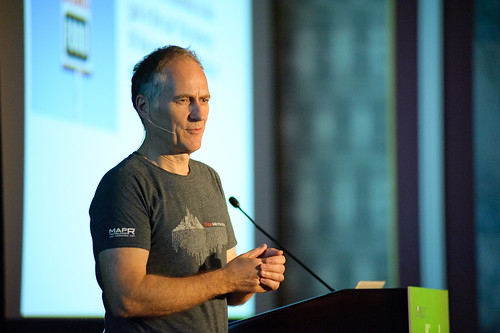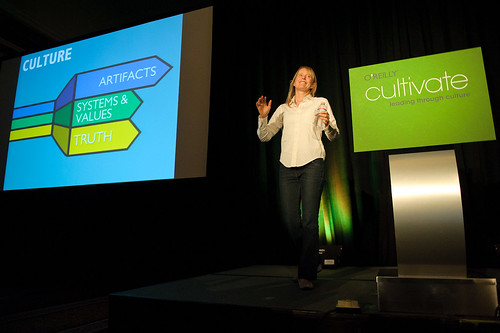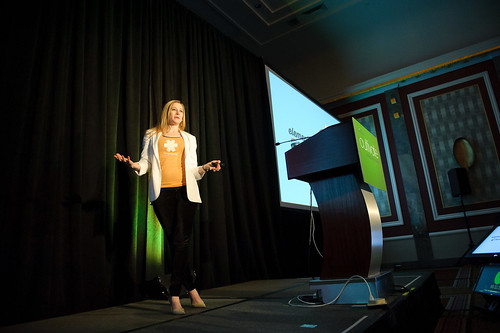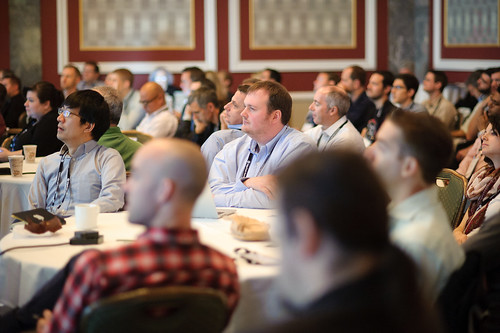Last week I had the opportunity to attend O’Reilly’s inaugural Cultivate Conference in New York City. Organized by two tech industry veterans, Eli Goodman and Kate Matsudaira, the conference was just what I needed: a group of super-intelligent folks getting together and talking about culture and leadership in an industry where such discussions are all-too rare. Instead, our field celebrates the “cult of the engineer“: the singular focus on often-heroic technical achievement to the exclusion of all the other factors, including leadership and organizational development that are needed for companies to truly succeed both as industry leaders and as sane places to work.
The celebration of minimal or no leadership has been subtly reinforced by blog posts from company founders like Ryan Carson of Treehouse, which seem to imply that management (and leadership) only get in the way of product development. These kinds of blog posts sadden me. I’ve certainly worked in enterprises where layers of useless middle management decreased business agility and added to the firm’s impending obsolescence, but I’ve also had managers who truly took the time to consider my career development and served as my mentors. Obviously, I am conflating “management” and “leadership”, and these are two different things. But at the end of the day, good managers do serve a useful function, and to abolish that role entirely leads to stunted growth in an organization.
I’m getting ahead of myself as I preach from the soapbox, so let me summarize some of the interesting lessons I learned from the conference. This will be a series of posts, because there’s no way I can write this all at one sitting.
Keynote: Tim O’Reilly on How I Failed

Obviously, Tim hasn’t failed. As the CEO of O’Reilly Media, he’s been able to build a very successful business despite whatever mistakes he claims to have made. Indeed, his original post on this topic read more like marketing material rather than an actual mea culpa. But Tim’s presentation at Cultivate cut out the marketing, and he presented the following six salient lessons for any growing business:
- Not making sure his team was hearing the things he was saying. Sometimes when you state things to your team, they hear the complete opposite of what you said, so it bears repeating and clarifying until they really get your message. A classic example O’Reilly cited was the book, Liar’s Poker, by Michael Lewis, which was meant as a cautionary tale against the “greed, gluttony, and outrageous fortune” that ultimately led to the 1989 Black Monday crash. Instead, Lewis’ book was interpreted by new business school grads as career inspiration, and many of them went into finance, ultimately contributing to the 2007-2008 financial crisis.
- Turning it over to the professionals. In other words, as CEO, letting one’s values be compromised because the lawyers/HR people/CFO/CTO have done it a different way. Clearly, not every hill is worth dying on, but O’Reilly advocates pushing back on important things that don’t agree with the values you want to set for your team — even if counsel thinks you’ll get sued. An example: O’Reilly wanted to publish a very simple employee manual stating that every rule was meant to be broken at some point and for employees to use their judgment, but was talked out of it by his attorney. He wishes he’d had the gumption to ignore the legal advice and go ahead with it.
- Lack of financial and operational discipline. This one’s pretty simple. O’Reilly states that they nearly went broke during the dot-com bust and had to lay off 25% of their staff, because they were never cash flow positive. He then discovered that some employees were stealing from the company. The moral of the story, says O’Reilly: your financial team is very important: treat them as co-founders. Also, be frugal but spend money on things that matter, and hold teams accountable for their numbers. “People need to know the business of their business,” he said.
- Tolerating mediocrity. “I should have channeled my inner Steve Jobs” more frequently, he said. Also, if you have a gut feeling, listen to it. He cited the example of the first Perl conference O’Reilly organized: he had a feeling the hotel was not up to snuff, so he put his foot down and demanded that the event staff change it.
- Hiring supplements and not complements. In other words, don’t just hire more of what you already have. Hire people who will contradict and challenge you. And, as CEO, don’t be the smartest person in the company at anything. “Hire people who are smarter than you, even in your strengths,” he said.
- “Filling in” for not strong performers. This is also known as “I’ll take care of that”. Instead, as a leader, it’s your job to fix the system, not to be doing people’s jobs. He quoted Claude Levi-Strauss, who wrote in The Savage Mind about being a bricoleur instead of an engineer.
O’Reilly ended with a great quote from Marc Hedlund, VP of Engineering at Stripe, who said,
People and code are… different. The approaches for getting new software to run are not directly applicable to getting people to work well together.
This advice is applicable to any field. If you are a civil engineer, your knowledge about tensile strength of steel and how to best build bridges are useless when it comes to managing a team of civil engineers, so you’re going to have to learn a whole new skill. Similarly, just because you’re a crack Scala developer it doesn’t mean that you’re going to start off being any good at managing other developers.
Elaine Wherry on “Cracking the Culture Code”

Wherry, the founder of Meebo, opened with some excellent points about what culture is not. For example, culture is obviously not just things that we can touch. Artifacts are not culture, and companies that try to create a great culture by providing free food, foosball tables, etc. fail to do so unless the artifact actually reflects the underlying culture in some way. In the same way, good communication can’t be created by a proliferation of tools — all-hands meetings, Yammer, HipChat, etc. can help facilitate communication & reinforce the values of a company, but they can’t substitute for a lack of coherent message, e.g. “what’s our mission?” or “why are we here?” She went on to say that culture is made up not only of artifacts, but also by systems & values, as well as “truth” — this is Edgar Schein‘s theory of organizational behavior in a nutshell. Truth is organization-dependent: for the government, truth lies in laws, but for the Mafia, truth lies in family. Every company has its own source of truth.
Within the systems & values of an organization, trust is an important factor. Trust is either given or earned and it forms the linchpin of the culture in a given organization. If trust is given, it means employees are given wide latitude to do the right thing from the very beginning, but as the company grows, this can be chaotic and hard to scale. On the other hand, if trust is earned, the company moves in a very predictable way, it’s easier to scale, but there is more structure and employees often feel like they are simply a cog in a machine. Startups, she says, often start in a “given” model, move to being an “earned” model as become viable, and then eventually settle somewhere in the middle, adopting both. At the end of the day, she says, politics arise from poor accountability, no matter the system.
Kate Matsudaira on Defining Leadership

“Defining leadership” is not how Kate started her talk. Her talk was titled “What do you do all day?” and she started off discussing how to measure performance, though she quickly dove into “what is leadership?” without really good answers about how to measure performance.
She defines leadership as being “power used effectively”. That can be both formal and informal power. One need not have a title of “Senior Manager” or have direct reports to have power & influence and thus be a leader. This is particularly germane to organizations that technically have no formal management (like GitHub or Treehouse) — in those organizations, it’s not really “no managers”, it’s “all managers”.
Informal power comes not only from charisma and being a domain expert. Primarily, it comes from having good relationships with people, and everyone has the ability to increase the value of their relationships, which are concomitant with a high level of trust. Kate spent the rest of the talk giving practical suggestions for how to improve your relationships:
- Be on time to your deliverables and appointments. Nothing says “my time is more valuable than yours” than being late to everything.
- Celebrate wins: email your co-workers and their managers when they’ve done a great job.
- Be open. Engineers are trained to build resilient, high-performing systems, which means pointing out flaws in everything. But new ideas are fragile, so they need to be nurtured. Don’t kill them off right away even if they’re not perfect. Instead, take an interest in ideas, be positive, and reflect on what you’re going to say before you say it.
- Every team will have a certain amount of complaining. As a leader, don’t commiserate, just listen. Reframe complaints to consider things from the other party’s viewpoint, and look at situations through the lens of the future. What will you learn about this situation in six months?
I’ll have more summaries in the next post.
